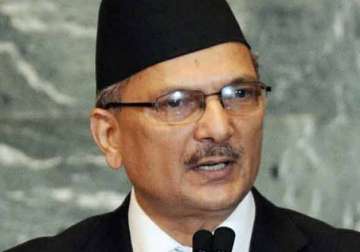Kathmandu: Baburam Bhattarai, Nepal's former prime minister and top Maoist leader sympathetic to Madhesis, on Saturday resigned as lawmaker and also quit the party to form his own political "force" amid differences with the major Nepalese political parties over the new Constitution.
Bhattarai, a veteran leader of the Unified CPN-Maoist, was the senior-most leader after party chief Pushpa Kamal Dahal, popularly known as 'Prachanda'.
Bhattarai, who spent his years as a student at New Delhi's Jawaharlal Nehru University and is said to have close links with India, has been sympathetic to the agitation launched by Madhesi parties demanding more rights and representation to the people residing in the southern plains of Nepal.
He has consistently attacked lawmakers, including members of his own party, for not taking minorities' concerns into account during the drafting of the new Constitution -- Nepal's first by elected representatives.
The 61-year-old leader has indicated that he would form a new political "force" within a couple of months.
"Effective from today's date I have resigned from all obligations, responsibilities at all levels as well as general membership of the UCPN Maoists," Bhattarai told reporters.
"I will now do what I can as a citizen of this country... as long as I am alive I will work for the country and the people," he said.
He also appeared to distance himself from the Maoist ideology and said Maoism has become irrelevant and obsolete in today's world. He has indicated that his new party would be democratic in nature.
Bhattarai's decision has given a big jolt to the UCPN-M as he leads a strong faction within the party, say insiders. The UCPN-M has 124 seats in the 601-member Parliament.
Party sources say nearly half of the Maoist lawmakers are likely to toe Bhattarai's line.
During a press conference, Bhattarai said he would visit cities in the troubled Terai region, some of which are close to the Nepal-Indian border, in a few days to understand the situation there.
Bhattarai will visit Biratnagar, Janakpur, Nawalparasi and Nepalgunj in southern Nepal. But he would first visit Janakpur on Tuesday, his close aides said.
The Terai region (plains) has been on the boil since the new Constitution was debated. The Madhesis, Indian-origin inhabitants of the plains, are up against the new charter, alleging that it doesn't protect their rights and interests.
The ethnic Tharu community say the model of splitting Nepal into seven provinces leave them under-represented in the country's Parliament. More than 40 people have died in the ensuing protests over the new Constitution.
Bhattarai, who led the second Maoist government between 2011 and 2013, was one of the key figures behind Nepal's civil war that killed nearly 17,000 people. He was the vice chair of the UCP-M that fought a decade long war to topple the monarchy in Nepal.
Latest World News
